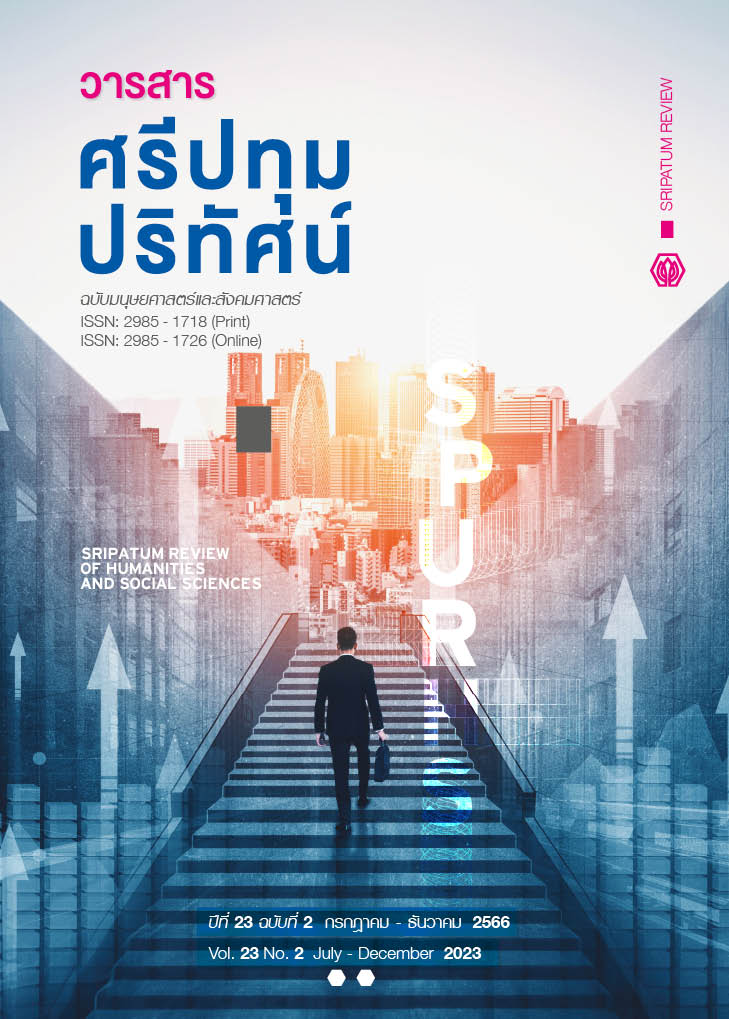Kao Na Pa Hom Phanom Community Enterprise: Developing the Rainfed Rice Farmers’ Potential towards the Change Agents with the GROW Model Group Process in Ban Phanom Nang Community, Huai Krachao District, Kanchanaburi Province
Main Article Content
Abstract
The objectives of this research were to study the community context and Ban Phanom Nang rainfed rice farmers’ management methods and to develop farmers’ potential to become change agents in establishing community enterprises. 50 informants were selected using purposive sampling methods consisting of Ban Phanom Nang rainfed rice farmers. Data were collected through in-depth interviews, and focus group discussions using semi-structured interviews. The learning process was conducted along the GROW Model principle. Data were analyzed based on content analysis, interpretation, and the results of the learning processes. The accuracy of data was verified by using the triangulation technique and the reflection process with informants’ participation. The research results revealed that the Ban Phanom Nang agricultural community faces farming risks due to a lack of systematic group management, which limits their access to various development mechanisms. Developing farmers’ potential through learning processes according to the GROW Model principles has created 37 change agents to establish the Khao Na Pa Hom Phanom community enterprise, which will be a community farmers’ institute that facilitates access to development mechanisms. Knowledge from lessons learned will be a model for communities, localities, and related parties to scale up development results to create changes in sustainable local development.
Article Details

This work is licensed under a Creative Commons Attribution-NonCommercial-NoDerivatives 4.0 International License.
1. กองบรรณาธิการสงวนสิทธิ์ในการพิจารณาและตัดสินการตีพิมพ์บทความในวารสาร
2. บทความทุกเรื่องจะได้รับการตรวจสอบทางวิชาการโดยผู้ทรงคุณวุฒิ แต่ข้อความและเนื้อหาในบทความที่ตีพิมพ์เป็นความรับผิดชอบของผู้เขียนแต่เพียงผู้เดียว มิใช่ความคิดเห็นและความรับผิดชอบของมหาวิทยาลัยศรีปทุม
3. การคัดลอกอ้างอิงต้องดำเนินการตามการปฏิบัติในหมู่นักวิชาการโดยทั่วไป และสอดคล้องกับกฎหมายที่เกี่ยวข้อง
References
Ashkenas, R. (2023). Leader’s Handbook. Bangkok: Active Print Co., Ltd. (In Thai)
Barisri, J. (2020). Strengthening Process of a Model Community of Sufficiency Economy: A Case Study of Ban Kutkhae Na Ngam Subdistrict Selaphum District Roiet Province. Journal of Social Science and Buddhistic Anthropology, 5(9), 397-409. (In Thai)
Boonkrong, N., Permpoon, A., and Suktam, W. (2022). Factors for the Success of the Establishment of a Sustainable Organic Farming Community Enterprise at Ban Thung Ko. Journal of Local Governance and Innovation, 6(1), 27-40. (In Thai)
Chaetnalao, P., and Maneesri, T. (2020). Supply Chain Management Model for Community Enterprise of Sustainable Agricultural Product Groups. NRRU Community Research Journal, 14(1), 133-145. (In Thai)
Community Organizations Development Institute. (2020). Community Business Model Canvas:
CBMC. [Online]. Retrieved August 1, 2022, from https://web.codi.or.th/wp- content/upleads/2020/03/คู่มือการจัดทำแผนธุรกิจเพื่อชุมชนเผยแพร่.pdf. (In Thai)
Ellyn Sugeng Desyanty. (2018). Farmers Group as Community Change Agents (Study of the Role of Farmers’ Group “Mugi Rahayu” Tegalsari Village, Ponorogo District in Improving Farmer Performance). Advance in Social Science, Education and Humanities Research, 285, 124-128.
Innovation-based grassroots economic development promotion unit project. (2021). GROW Model Platform under the sustainable grassroots economic development program. Bangkok: Kasetsart University. (In Thai)
Nilpeng, N. (2017). Change agent in the 21st century. Journal of Nursing and Health Care, 35(1), 16-19. (In Thai)
Phithuk, A. and Rungkhunakorn, P. (2021). The Guideline for Farmer Development Towards the Smart Agripreneurship. ARU Research Journal, 8(1), 17-23. (In Thai)
Puangngam, K. (2010). Community and Local Self-management. Bangkok: Bopit Printing. (In Thai)
Rerkkham, S. (2014). Human Resource Development: Principles and Applications. Bangkok: Chulalongkorn University Printing House. (In Thai)
Sangayotin, T. (2022). Potential Development for Competitiveness Enhancement of Community Enterprises in Thailand’s Southern Border Provinces. RMUTT Global Business and Economics Review, 17(1), 96-108. (In Thai)
Schiffman, G. and Kanuk, L. (1991). Consumer Behavior. 4th. Ed. New Jersey: Englewood Cliffs.
Sirasunthon, P. (2013). Concepts, theories, techniques and applications for social development. Bangkok: V. Print (1991) Co., Ltd. (In Thai)
Suratpipit, T. (2023). People Transformation. 1st ed. Bangkok: WISH GROUP (THAILAND) COMPANY LIMITED. (In Thai)
Suthinarakorn, W. (2013). Action Research: Research for freedom and creativity. Bangkok: Siam Review Publishing Company Limited. (In Thai)
Thaichareon, T. (2023). Sustainable Development of Community Enterprises in Chachoengsao Province. Journal of MCU NakhonDhat, 10(1), 276-292. (In Thai)
Whitmore, J. (2019). Coaching for Performance. [Online]. Retrieved September 1, 2023, from https://www.performanceconsultants.com/grow-model
Worratchaiphan, C. (2017). Green space and urban biodiversity: Measures to Cope with climate change of local government organizations. 1st ed. Bangkok: Sun Pagaging (2014) Co., Ltd. (In Thai)
Yamnill, S., and Yodhaboribal, S. (2019). Development of Community Strength and Sustainability: A Case Study of Wat Lumphaya Floting Market. Silpakorn Education Research Journal, 11(2), 199-214. (In Thai)


